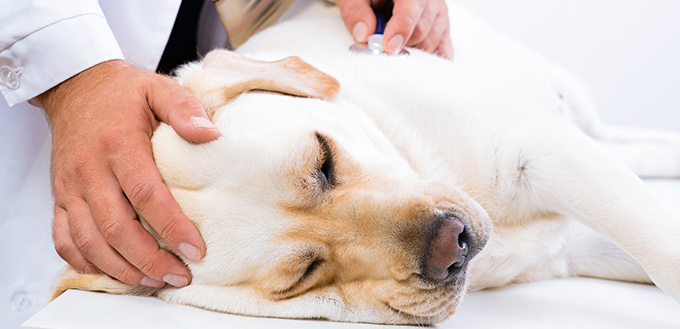Rat poison may be helpful for dealing with rodents, but it can cause a lot of problems for your pooch. If it ingests dangerous chemicals, your dog’s health can be seriously threatened. For the safety of your furry friend, you should learn everything about rat poisoning in dogs provided in this article. We will cover possible causes and ways to prevent this from happening in the first place, as well as how to react if you suspect that your dog ingested hazardous chemicals.
What Causes Rat Poisoning in Dogs?
In short, rat poisoning occurs when your pet ingests dangerous compounds contained in the poison. There are two ways that this could happen. The obvious one is that your Fido eats rat poison. That is why you need to make sure he stays away from all areas where you used the chemicals. You should also watch where you are keeping the bottle that contains the poison. It is essential to ensure that it remains out of your pet’s reach.
An alternative cause of poisoning can be that your pet ate a rat that previously ingested the poison. This is less likely to happen, but it is something to keep in mind.

Types of Rat Poisons
There are three types of rodenticides that you should be aware of:
- Bromethalin – this type of poison attacks the cells in a dog’s organism. It does that by elevating the sodium amount inside them, which leads to water increase. That causes the swelling of cells and subsequently their death. In theory, it can assault the entire body, but it’s the central nervous system that is primarily affected, and that includes your dog’s nerves, spine, and brain. The problem with this poison is that ingesting large amounts of it can quickly be fatal
- Cholecalciferol – this rodenticide elevates calcium levels in your pet’s organism. That can have severe consequences, including abnormal heart function and renal failure
- Anticoagulant – this type of poison can have various active ingredients, including warfarin, diphacinone, and bromadiolone. The way this rodenticide works is that it prevents the organism to recycle vitamin K. That can stop blood clotting and lead to internal bleeding, which may even cause death
Symptoms of Rat Poisoning
Let’s discuss how you can recognize the symptoms of rat poisoning in dogs. The vital thing to know is that the symptoms may vary from one type of poison to another and depend on the canine.
The worst case scenario is that your pet ingested considerable amounts of bromethalin rodenticide. If that is the case, you will recognize symptoms like hyperthermia, severe muscle tremors, or generalized seizures. These will occur within 24 hours from ingesting the poison, but it is critical to notice and react as soon as possible and act in according to the instructions below.
If bromethalin is ingested in smaller dosages, the symptoms may be different and manifest up to 72 hours after your dog eats the poison. These symptoms include paralysis or paresis, hind limb ataxia, and CNS depression.
Cholecalciferol poisoning should manifest itself four hours after the ingestion, but it can take up to 36 hours depending on the dosage. The symptoms will include dehydration, fatigue, cardiac arrhythmia, lethargy, polydipsia and polyuria.
As for anticoagulant poison, the symptoms may not occur for three to seven days. The symptoms will include lack of appetite, bleeding gums, nose bleeds, vomiting, and blood in the stool.
What to Do If You Suspect That Your Pet Is Poisoned?
The best thing that you could do if you suspect rat poisoning in dogs, the best thing that you can do is to take your Fido to the veterinarian as soon as possible. If vomiting has already occurred, it is a smart idea to grab a sample and take it with you. If you are aware of which poison your pet ingested, you should ensure to share that info with your vet. If you have a sample of the poison, make sure to bring it so that the professional can take a look at the bottle. The veterinarian will have better chances at properly treating your dog if they get as much information as possible about the poisoning.
There is a way to react and help your dog yourself, but the key thing to remember is to be absolutely certain what kind of poison they ingested. If you are sure that it is cholecalciferol, you can try to induce vomiting, but only if the poisoning occurred within the past two hours. You can also let your pet to drink some water because dehydration is also a symptom of this poisoning. When it comes to treatment at the vet, there is no particular antidote that the professional can administer. The therapy includes various drugs, such as steroids and diuretics, as well as administering IV fluids. This all has the goal to allow your animal to get rid of the excess calcium in its organism.
If you can react quickly after the dog ingests bromethalin. You can induce vomiting since it is part of the therapy that has the goal of emptying the digestive system entirely. The veterinarian will probably have to analyze brain, kidney, and liver so that he could verify the poisoning and find out its severity. After that, they might resort to administering fluids through IV and inducing vomiting. If brain swelling occurs, other drugs may be administered, too.
The way of confirming that your dog was poisoned by anticoagulant rodenticides is to analyze your pet’s plasma or stomach contents. That is probably what your vet will do as soon as you take your dog there. Bleeding is the primary symptom of this poisoning and vitamin K can be administered to stimulate blood clotting and used as antidote. The veterinarian might also decide that your dog needs dosages of plasma and blood. In this case, you shouldn’t induce vomiting unless you were strictly instructed by your vet upon contacting him on the phone.
The crucial thing to keep in mind is that quick reaction might be crucial to save your pet from death or any other severe consequences. We encourage you to call a professional as soon as you suspect of possible poisoning and act according to the instructions you receive.

How Long It Will Take Your Dog to Recover?
The good news is that the worst has passed once your dog has received proper treatment for poisoning. However, the recovery process doesn’t end here. Depending on the severity, it might take days or weeks for your pet to recover. During that time, you will need to provide proper care and support to your Fido.
Your vet will probably tell you to get your dog to regular check-ups during the recovery period. In cases of cholecalciferol rodenticides, it can take up to six weeks for your pooch to recover. The vet will probably monitor the levels of phosphorus and calcium in their organism. The ultimate goal is to return them to normal. As renal failure is one of the symptoms of this poisoning, the vet might decide to monitor this function as well.
When it comes to bromethalin poisoning, the main thing to take care of is to prevent your dog suffering from anorexia. It might be smart to include various supplements in your pooch’s diet during this period, but make sure to consult with your vet first. Up to four weeks may be needed for your dog to make the full recovery from ingesting anticoagulant rodenticides. They will be weak during this period and it is essential to take them to the vet as soon as you notice anything weird going on. That may mean any sign of illness, such as coughing or diarrhea.
You May Also Like: Calcium Supplements for Dogs
How to Prevent Rat Poisoning in Dogs?
Both your dog and you will go through a lot of trouble in case of poisoning, which is why you should give your best to prevent your pet to ingest any dangerous chemicals. Here are some tips that you can use to stop that from happening:
- Make sure you keep the poison away from your dogs – it is desirable not to use rat poisons at all, but sometimes you will need to do that to deal with rodents. In that case, you must ensure to keep the remaining poison in a place where your pet can’t reach it. Lifting it to a top shelf or putting it inside a safe container is a smart idea
- Keep your dog away from the rooms where you applied poison – if you used rodenticides in your basement, you want to keep it locked so that your Fido cannot enter.
- Remove dead rodents as soon as possible – you will probably encounter bodies of rats who ingested the poison. Make sure to throw out these rodents as soon as possible because your pet can eat them and ingest poison that way
We hope that you learned a lot of useful things about rat poisoning in dogs from this article. The crucial thing to keep in mind is that instant reaction and taking your pet to the vet’s office is vital and may significantly help your pooch to deal with consequences of ingesting rodenticide.
Sources:
- Dr. Justine A. Lee, The Dangers of Rat Poison to Dogs and Cats, Pet Health Network
- Dr. Wendy C. Brooks, Rat Poison’s Effect on Dogs and Cats, Veterinary Information Network
Note: The advice provided in this post is intended for informational purposes and does not constitute medical advice regarding pets. For an accurate diagnosis of your pet's condition, please make an appointment with your vet.







